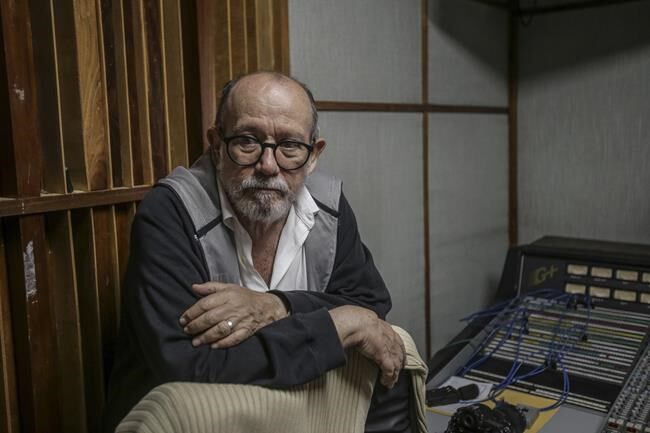HAVANA (AP) — He was the poetic voice of the Cuban Revolution, an inspiration for millions of Latin Americans living under dictatorships throughout the 1960s and 1970s who dreamt of the ideal Cuba that he — and his guitar — helped to evoke.
Cuban troubadour Silvio Rodríguez, 77, one of Latin America's most famous musicians, has released a new album, his first in three years. But life on the island, which is undergoing its worst economic crisis in decades, has changed much since the time he wrote “Vivo en un país libre cual solamente puede ser libre” (I live in a free country, which can only be free).
“I feel uncomfortable singing that song now,” said Rodríguez during a rare interview with The Associated Press in his recording studio in Havana.
The Cuban revolutionary project to which Rodríguez devoted most of his music and lyrics since his debut 56 years ago, is going through a that has brought inflation, hunger, unproductive lands — and pushed hundreds of thousands of Cubans to leave the island.
Rodríguez, who regards himself as a man of the left, says that is not an excuse to ignore the economic crisis that Cuba is going through and that has him worried.
“It’s terrible,” he said repeatedly when asked about Cuba's ongoing crisis. “It’s very strong, very strong.”
Rodríguez's new album, “Quería saber” (I Wanted to Know), includes 11 songs written between 2019 and 2023, some of which express disappointment with the path his country is taking.
“And while they imagine themselves cool and conscientious, the reality is a show of inefficiency. The young run away en masse,” read the lyrics of “Para no botar el sofá” (To not throw away the couch), in which Rodríguez sings about the youth who have left the island.
While he's aware of his country's challenges, he says he remains loyal to at least some of the principles of the revolution, including universal health care and education.
“Most people everywhere just want to live their lives peacefully, to make a little progress, to have some opportunities,” he said.
Born in the small town of San Antonio de los Banos, near Havana, on Nov. 29, 1946, Rodríguez was a teenager when the revolution led by , a figure he continues to admire, triumphed in 1959.
Like many young people of his generation — and others that came after him — Rodríguez joined the call to work for his country. He became a literacy teacher, a militiaman, did his military service and was sent to Angola as part of the Cuban military missions in the war against groups supported by South Africa’s apartheid government.
He made his debut in the mid-60s with what would become his inseparable guitar, and went on to perform in dozens of countries including Germany, Chile, Argentina, Mexico, Spain, Denmark, Sweden, Nicaragua and the United States.
He released 20 albums and wrote more than 500 songs, filling stadiums and theaters worldwide with fans who idolize him for his music and the weight of his poetry, full of powerful metaphors.
“I never took myself seriously,” Rodríguez said about his long-lasting fame. “One is the result of one's work.”
When asked about his legacy, he answers with the same candor. “The virtue that songs have is that they keep people company. If any song of mine serves that purpose, who could want more?”
___
Follow AP’s coverage of Latin America and the Caribbean at .


